Canadian Coast Guard Orders Hybrid Research Vessel
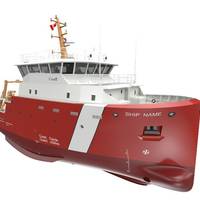
Shipbuilder Chantier Naval Forillon in Gaspé, Quebec has received an order to build a new Near-Shore Fishery Research Vessel (NSFRV) for the Canadian Coast Guard.Expected to join the Canadian Coast Guard fleet as early as 2027, the new vessel will be the agency's first-ever diesel-electric hybrid vessel with a battery energy storage system, designed to reduce the consumption of fossil fuels.Announced last week by Diane Lebouthillier, Minister of Fisheries, Oceans and the Canadian Coast Guard…
North American Lobster Industry Confronts 'Ropeless' Traps After Whale Entanglements
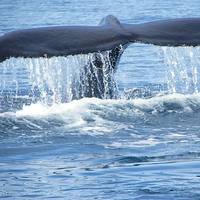
An emerging technology to fish for lobsters virtually ropeless to prevent whale entanglements is exciting conservationists, but getting a frigid reception from harvesters worried it will drive them out of business and upend their way of life.Injuries to endangered North Atlantic Right Whales ensnared in fishing gear have fueled a prominent campaign by environmental groups to pressure the industry to adopt on-demand equipment that only suspends ropes in the water briefly before traps are pulled from the water.The Monterey Bay Aquarium’s Seafood Watch…
Canadian Coast Guard Plans to Order Up to 61 Small Vessels
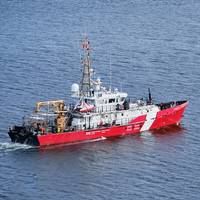
The Canadian Coast Guard has revealed big plans to invest in its fleet of small vessels.Joyce Murray, Minister of Fisheries and Oceans and the Canadian Coast Guard, on Thursday announced $2.5 billion CAD (roughly $1.8 billion USD) for the construction of up to 61 new small vessels and the ongoing replacement of small craft, barges and workboats within the Canadian Coast guard fleet.“This is a critical investment that will help modernize the Canadian Coast Guard’s small vessel fleet,” Murray said.
Canadian Coast Guard to Test Biodiesel, Build Hybrid-electric Vessel
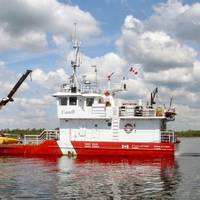
The Canadian Coast Guard (CCG) announced a pair of initiatives aimed at reducing its greenhouse gas emissions, including the start of a biodiesel testing project and the launch of the next phase in the construction of the Government of Canada’s first hybrid electric vessel.Earlier this month, following the award of a contract to procure biodiesel from Windsor, Ontario based Sterling Fuels, CCG became Canada's first government agency to trial a 20% biodiesel blend in one of its vessels, the navigation aids tender CCGS Caribou Isle.
Canadian Coast Guard Decommissions Its Oldest Serving Vessel
The Canadian Coast Guard is decommissioning its oldest serving vessel after 59 years of service.The offshore oceanographic and hydrographic survey vessel CCGS Hudson, taken out of service after a starboard propulsion motor failure in November 2021, will be decommissioned due to the scale of the problem and the time and cost to repair it, combined with the costs associated with an upcoming period of regulatory compliance work."It has been determined that the ship is beyond economical repair and further investment would not allow it to return to reliable service," the Coast Guard said on Wednesday.Built at Saint John Shipbuilding, the 90.4-meter-long CCGS Hudson entered service in 1963 as the first Canadian ship constructed specifically for hydrographic and oceanographic survey work.
NOAA Using Sailing Vessel for Ocean Research
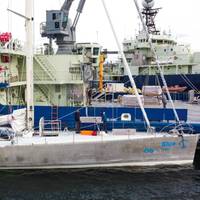
NOAA and partners have joined together to launch approximately 100 new Argo floats across the Atlantic ocean to collect data that supports ocean, weather and climate research and prediction. These will bolster the international Argo Program, which maintains a global array of about 3,800 floats that measure pressure, temperature and salinity of the upper 2,000 meters (1.2 miles) of the ocean.The French sailing vessel Iris recently arrived in Woods Hole, Mass., after deploying the initial batch of 17 Argo floats across the Atlantic.
Wreck of USRC Bear Found off Nova Scotia
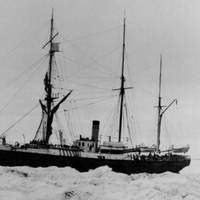
The decades long mystery of a missing U.S. Coast Guard Ship has finally been solved. U.S. Revenue Cutter (USRC) Bear, lost at sea in 1963, has been found on the seafloor about 90 miles south of Cape Sable, Nova Scotia, NOAA Rear Adm. Nancy Hann announced Thursday.Widely considered one of the most historically significant ships in American history, Bear was purchased by the U.S. government and first put into service by the U.S. Navy as part of the rescue fleet for the Greely Expedition to the Arctic in 1884, attaining legendary status for the rescue of the expedition's few survivors.
A BC Ferries Case Study: Lessons Learned in Setting Underwater Radiated Noise Targets
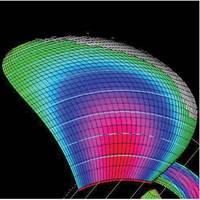
In a typical year, the waters surrounding British Columbia’s Port of Vancouver host approximately 3,000 deep sea commercial vessels and 19 of the 35 ferries operated by BC Ferries, one of the largest ferry operators in the world. These waters are also home to a wide variety of aquatic wildlife, including the southern resident killer whales (SRKW), which have been listed as endangered in Canada since 2003.With vessel-generated acoustic disturbances identified by Fisheries and Oceans Canada as one of four key threats to the SRKW…
Seaspan Shipyards Begins Building Canada's New Research Ship
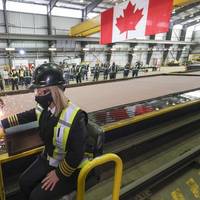
Canadian shipbuilder Seaspan Shipyards announced on Monday it has cut steel and started full-rate construction of the newest oceanographic science research vessel for the Canadian Coast Guard and Fisheries and Oceans Canada.The 88-meter Offshore Oceanographic Science Vessel (OOSV) is being built under Canada's National Shipbuilding Strategy (NSS) at Seaspan’s multi-program Vancouver Shipyard concurrently with the first Joint Support Ship (JSS) for the Royal Canadian Navy.The OOSV will support oceanographic…
exactEarth to Provide AIS Services for MDA's Dark Vessel Detection Program
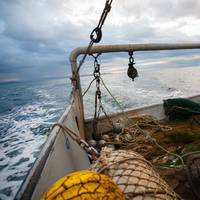
exactEarth Ltd. has signed an agreement with MDA to provide advanced Satellite-AIS data services as part of MDA's recently announced Dark Vessel Detection (DVD) program for the Government of Canada. The DVD program is intended to detect and identify vessels that have switched off their AIS transponders and are engaged in illegal, unreported and unregulated (IUU) fishing.IUU fishing is a global problem that results in significant economic loss—estimated at $23 billion per year…
New Study Finds Polyester Fibers Throughout the Arctic Ocean
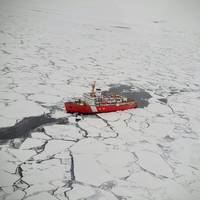
The Arctic has long proven to be a barometer of the health of our planet. This remote part of the world faces unprecedented environmental assaults, as climate change and industrial chemicals threaten a way of life for Inuit and other Indigenous and northern communities that rely heavily on seafood and marine mammals for food.But who would have imagined that the clothes we wear might add to this onslaught? Evidence increasingly shows that tiny synthetic fibers are permeating the Arctic Ocean and finding their way into zooplankton…
CCGS John Cabot Starts Sea Trials
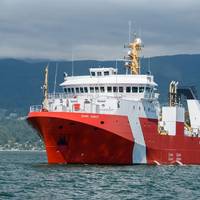
The Canadian Coast Guard’s third Offshore Fisheries Science Vessel (OFSV) has begun sea trials just six weeks after being launched by Seaspan Shipyards in Vancouver, B.C.The future Coast Guard vessel the CCGS John Cabot cruised out of English Bay on Wednesday to begin sea trials, marking another major milestone for this third OFSV built under Canada’s National Shipbuilding Strategy (NSS).Over the next 10 days the 63.4-meter-long ship will be put through its paces during rigorous full-scale exercises where specialists from Seaspan Shipyards…
Video: Seaspan Shipyards Launches CCGS John Cabot
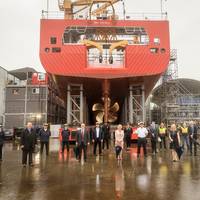
Canadian shipbuilder Seaspan Shipyards on Friday launched the final ship in a series of three Offshore Fisheries Science Vessels (OFSV) for the Canadian Coast Guard.The 63.4-meter CCGS John Cabot will next undergo sea trials before its delivery to the Coast Guard later this summer. The vessel will be based in St. John’s, Newfoundland and Labrador.CCGS John Cabot and previously delivered sister ships, CCGS Sir John Franklin, now stationed in Victoria, British Columbia, and CCGS Capt Jacques Cartier…
CCG Adds OFSV to its Fleet
Seaspan Shipyards (Seaspan) has completed Delivery of Canadian Coast Guard Ship (CCGS) Capt. Jacques Cartier, the Canadian Coast Guard’s newest state-of-the-art Offshore Fisheries Science Vessel (OFSV), the second OFSV delivered by Seaspan."The milestone in the shipbuilding process took place exactly five months and two days after the delivery of her sister ship, the CCGS Sir John Franklin. These two ships are the first large vessels delivered under the National Shipbuilding Strategy, the Government of Canada’s plan to renew the federal fleet with ships built in Canada for Canadians," said a press note.In addition to major partners like Thales Canada who are responsible for the vessel’s Electronic Systems and Vard Marine…
Seaspan Delivers Canada's First OFSV
Seaspan Shipyards has delivered Canada's first new Offshore Fisheries Science Vessels (OFSV), the CCGS Sir John Franklin, to the Canadian Coast Guard (Coast Guard).An official handover ceremony took place aboard the vessel attended by the Minister of Fisheries, Oceans and the Canadian Coast Guard, senior officials from the Coast Guard, Seaspan and supply chain partners.The delivery of the first OFSV is the culmination of years of work by hundreds of dedicated Seaspan employees and supply chain partners from across Canada.As the first large vessel to be built and delivered to the Government of Canada under the National Shipbuilding Strategy (NSS)…
Seaspan Launches Second Fisheries Science Vessel
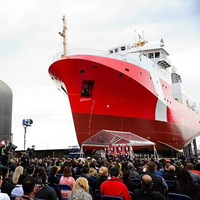
Seaspan Shipyards (Seaspan) hosted an event celebrating the launch of the second Offshore Fisheries Science Vessel (OFSV). In addition to dignitaries from the Government of Canada, the Canadian Coast Guard (Coast Guard), the Government of British Columbia and Seaspan’s supplier network, hundreds of proud employees attended the event with their families.The launch of OFSV 2 is the culmination of years of work by hundreds of dedicated Seaspan employees and supply chain partners from across Canada.
Work‘bots’: Autonomous Vessels Arrive
The near-shore and inland workboat fleet is at the leading edge for autonomous vessel developmentWhile the advent of autonomous workboats are not exactly mainstream, you better believe that in the not-too-distant future they will be a reality on waterways in and around the U.S. Today there remain more questions than answers, particularly on the legal, logistics and insurance side of the coin. But the technology is evolving at record pace, providing many in the industry with mixed emotions. Excitement. Controversy. Curiosity. Skepticism. These are just a few of thoughts, and emotions that arise to any mention of the topic of autonomous vessels.It’s happening now.
B-QUA for Ballast Water Surveillance
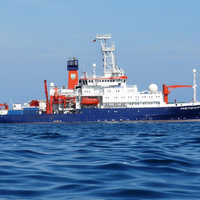
The Government of Canada is testing aqua-tools’ B-QUA ballast water sampling and monitoring kit for possible use in the Canadian ballast water surveillance program. The program is being led a research scientist from Fisheries and Oceans Canada out of the Great Lakes Laboratory for Fisheries and Aquatic Sciences, in Burlington, Ontario. The research scientist leading the program was also involved in a 2015 study to test the efficiency of various ballast water testing methods onboard the research vessel Meteor on behalf of Germany’s Federal Maritime and Hydrographic Agency (BSH).
Davie Wins Canadian Icebreaker Refit Work
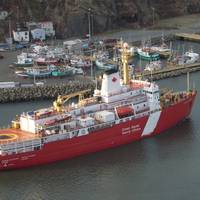
Canadian shipyard Davie said it has secured a contract for the upgrade and refit of Canada’s heaviest icebreaker, 50-year-old CCGS Louis St Laurent. The $14 million program, part of the Canadian Coast Guard’s multi-year maintenance plan, will mark the return of the CCGS Louis St Laurent to Davie in February 2017. According to a representative of Fisheries and Oceans Canada, CCGS Louis St Laurent and its hull are in good condition, and the refit work set to take place from February 16 to June 23 has been commissioned to extend the life of the vessel and maintain its reliability.
Port of Prince Rupert Adds Shore-based Radar
The Port of Prince Rupert has commissioned a new shore-based radar regime designed to safely accommodate the port’s growth in vessel traffic and international trade. Shore-based radar builds on the existing vessel traffic service that provides active vessel monitoring and navigational information to vessels at the Port of Prince Rupert. Transmitting data from three tower sites across the port’s coastal shores, the system provides coverage ranging from the northeast of Haida Gwaii to the Alaskan border. “The addition of radar improves the capability of the port to proactively monitor and manage vessel movement in the harbor,” said Don Krusel, President & CEO of the Prince Rupert Port Authority.
Canada Embarks on Arctic Survey Mission
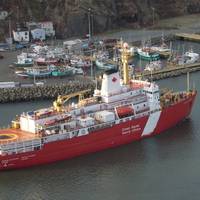
Canada has launched its 2016 Arctic expedition to collect important scientific information to support the nation’s submission on the extended continental shelf in the Arctic Ocean. This year’s survey is a collaborative effort with Sweden, and Danish scientists will also participate in the research. The Canadian icebreaker CCGS Louis S. St-Laurent left Dartmouth on July 22, 2016, for Tromsø, Norway, where it will take on board personnel from Natural Resources Canada’s Geological Survey of Canada…
Canada to Build 7 New Survey Vessels
Canadian Minister of Fisheries, Oceans and the Canadian Coast Guard, Hunter Tootoo, announced that Kanter Marine Inc. of St. Thomas, Ontario is the winning bidder for the procurement of seven new survey vessels for the Canadian Hydrographic Service to support the seabed surveying and charting of Canada’s navigable waters. The $5.3 million investment will go toward customized hydrographic survey vessels that will be outfitted with permanent state-of-the-art multibeam sonar systems to help the Canadian Hydrographic Service continue to meet rigorous international standards for hydrographic surveys. Once built, the seven new vessels will be added to the existing survey vessel fleet located across Canada. The new vessels will be employed to collect data in the St.
Ballast Water Management in the Field Put to the Test
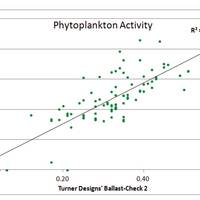
Turner Designs, along with scientists from around the world participated in a research cruise aboard the RV Meteor, a vessel owned by the Federal Republic of Germany through the Ministry of Research and Technology (BMFT) and funded by the German Research Foundation (DFG). The goal of this cruise was focused on ballast water sampling techniques and protocols. Various instruments were used to test collected ballast water enabling researchers to determine efficiency for the various sampling techniques employed.







